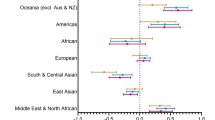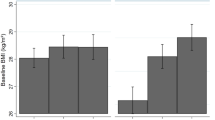Abstract
OBJECTIVES: This study examined the relationship between acculturation and obesity in United States (US) Hispanics, controlling for socioeconomic status (SES). METHODS: The sample included 3141 Mexican American, 828 Cuban American, and 1211 Puerto Rican adults 18–74 y of age in the 1982–84 Hispanic Health and Nutrition Examination Survey (HHANES). Acculturation was measured by language preference and generation; SES by income and education; and obesity by body mass index (BMI). RESULTS: Mean and standard deviations of BMI (kg/m2) were 25.9±4.4, 26.0±4.2, and 25.5±4.3 in men of Mexican American, Cuban American, and Puerto Rican origin, respectively. For women, the corresponding values were 26.6±5.8, 25.9±5.0, and 26.2±5.9. Linear regression models of BMI which included acculturation, income, education, and other covariates were carried out. Income and education were not associated consistently with BMI. Acculturation, but only among Mexican Americans, was associated with BMI. Specifically, greater preference for English was associated with reduced BMI among women (P<0.01). Also, men and women of the second (P<0.001 in both sexes) and third (P<0.01 in men and P<0.001 in women) generation had greater BMIs. Relative to the first generation, the increase in BMI units was 1.15±0.34 in men and 1.76±0.39 in women in the second generation and 0.83±0.31 in men and 1.83±0.37 in women of the third generation. CONCLUSIONS: BMI was not associated with SES, an unexpected finding since the relationship is generally negative in women from developed countries. The relationship between BMI and acculturation was weak and conditional. BMI in Mexican Americans appeared to be somewhat more sensitive to the process of acculturation than among Cubans or Puerto Ricans.
This is a preview of subscription content, access via your institution
Access options
Subscribe to this journal
Receive 12 print issues and online access
$259.00 per year
only $21.58 per issue
Buy this article
- Purchase on Springer Link
- Instant access to full article PDF
Prices may be subject to local taxes which are calculated during checkout
Similar content being viewed by others
Author information
Authors and Affiliations
Rights and permissions
About this article
Cite this article
Khan, L., Sobal, J. & Martorell, R. Acculturation, socioeconomic status, and obesity in Mexican Americans, Cuban Americans, and Puerto Ricans. Int J Obes 21, 91–96 (1997). https://doi.org/10.1038/sj.ijo.0800367
Received:
Revised:
Accepted:
Issue Date:
DOI: https://doi.org/10.1038/sj.ijo.0800367
Keywords
This article is cited by
-
Development and evaluation of a mother-centered toolkit for postpartum behavioral and psychosocial health
Journal of Behavioral Medicine (2018)
-
Pain-Related Symptom Reporting Among Hispanics: Implications for Forensic Psychological Evaluations
Psychological Injury and Law (2016)
-
“When you walk in the rain, you get wet”: A Qualitative Study of Ghanaian Immigrants’ Perspective on the Epidemiological Paradox
Journal of Immigrant and Minority Health (2015)
-
Exploring obesogenic environments: the design and development of the migrant obesogenic perception of the environment questionnaire (MOPE-Q) using a sample of Iranian migrants in Australia
BMC Public Health (2014)
-
Depression and Help Seeking Among Mexican–Americans: The Mediating Role of Familism
Journal of Immigrant and Minority Health (2014)



